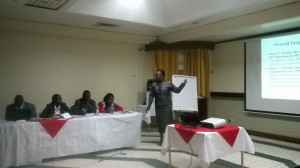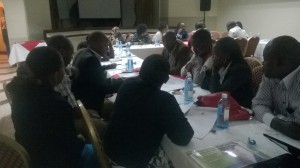Mentor Mothers Play Important Role in New Option B+ Guidelines in Kenya
“Single dose Nevirapine was like a bicycle; Option B+ was like a motorcycle; and this new Option B+ is like a fuel efficient limousine which allows for longer travel giving mothers better health.” This was how mothers2mothers (m2m) Mentor Mother Team Leader Irene Awuor, in Nairobi, Kenya, recently described the progress of interventions to prevent mother-to-child transmission of HIV. Irene was speaking at one of two workshops that m2m Kenya organised, through the government’s Kenya Mentor Mother Program, targeting Country AIDS and STI (sexually transmitted infections) Control Officers (CASCOs) on the role that Mentor Mothers can play in the successful implementation of Option B+ in Kenya.

A participant from the Ministry of Health facilitating a session
WHO acknowledges that client adherence, retention, and the strained health workforce are critical challenges that need to be addressed for the successful implementation of Option B+. Early findings on the rollout of Option B+ in Malawi indicate that women are significantly less likely to start taking their medications or continue with their treatment after their babies are out of danger from HIV infection, than HIV-positive women who start treatment for their own health.
In response, m2m – led by the National AIDS and STI Control Program (NASCOP) – is supporting a process to review and develop resource materials to help clients understand and adhere to Option B+. Furthermore, all of the Mentor Mothers at m2m Kenya’s model sites were taken through an adherence training package last year. Training Mentor Mothers on adherence education relieves some of the pressure on the already strained health workforce in Kenya. The enhanced role of Mentor Mothers should translate into improved client retention and adherence, including for women who are on anti-retroviral drugs for life through Option B+.

Participants discussing barriers and opportunities in the uptake of Option B+ during a breakout session
“For eMTCT (elimination of mother-to-child transmission) to succeed, Mentor Mothers are the way to go,” said Dr. Lenai, one of the CASCOs present at the workshop.






















